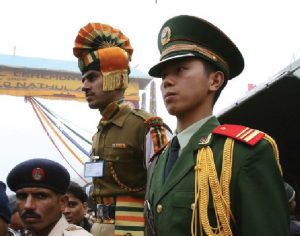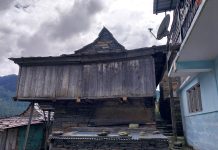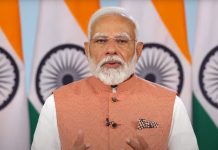 Seventy years of India-China diplomatic relations was a toast in September 2019 at the New Delhi’s China mission when the Chinese envoy Sun Weidong called for the elephant and the dragon to tango to march into the future which belongs to Asia.
Seventy years of India-China diplomatic relations was a toast in September 2019 at the New Delhi’s China mission when the Chinese envoy Sun Weidong called for the elephant and the dragon to tango to march into the future which belongs to Asia.
On July 11, 2020, 60 days after 20 Indian soldiers along with the Commanding officer Suresh Babu of 16 Bihar regiment were brutally killed by the PLA soldiers in a scuffle, Beijing now looking for a face-off, demanding trust and vouching ages old friendship and cultural commonalities, the envoy sounded just the contrary to the treachery, belligerence and the expansionist aspirations of his President Xi Jinping. In the brawl at Galwan, around 70 PLA soldiers were causalities yet undeclared by the Chinese state.
China’s military misadventure at the LAC in Ladakh was sensed since early May 2020 when MEA had informed that China had been amassing a large contingent of troops and armaments along the Line of Actual Control (LAC) and that the conduct of Chinese forces has been in “complete disregard of all mutually agreed norms”. Their preparations having started back since March, by this time PLA soldiers had already ensconced themselves firmly in strategic areas of Galwan valley, Hot Springs, Depsang and Pangang Tso which would give them control and surveillance over Indian troop movements at DBO uptill the northern borders along with furthering their cause of land grab. The intrusion was much within the Indian land as satellite images clearly zoomed.
Contrary to Prime Minister Modi’s statement on June 19 that no one had intruded and no one is there on the LAC, India’s top and well respected strategic affairs expert Ajay Shukla tweeted that the Chinese troops have altered the LAC at Galwan by a km, at Hot Springs by 2-3 km and at Pangang Tso by 8-10 km occupying Finger 4. He maintains that the Indian govt has made misleading claims and has been misleading media on Chinese disengagement along the LAC. In an interview on July 11, when Indian newspapers and news channels declared that Galwan and Hot Springs have been vacated by the Chinese, Colonel Shukla claimed in an interview to a leading daily that ‘China’s PLA has refused to withdraw in the Hot Springs area and at Gogra Heights….about 1500 soldiers from either side are in confrontation.’
This is after the disengagement and the de-escalation that has worked out after the 4 Corp Commander level talks, and a Special Representative level talk between NSA Doval and Chinese Foreign minister Wang Yi. Going by the government version, as the External Affairs Ministry stated on July 12 that ‘íts a work in progress,’ we are yet to hear about disengagement in the last fort of Pangang Tso as I write.
Therefore, for the country to be informed about the real position at the LAC, many questions remain unanswered. If there were no intrusions as stated by the Prime Minister what was the disengagement and de-escalation about? Secondly, if what Ajay Shukla says, (confirms by his long-cultivated sources at the border), the Chinese have moved into the Indian side of the LAC few km inside then why is the govt (PM, NSA, or the Army) not refuting or denying it? And by that count have we conceded the territory to the Chinese already? Former Foreign Secretary and National Security Advisor Shiv Shankar Menon says that there isn’t enough
information coming out clearly.
Drawing similarity between the Chinese pattern Menon said, ‘India’s Doklam standoff was a wrong lesson given to Chinese where a withdrawal was negotiated by both sides from the face off point in 2017 but they finally set up a permanent presence on the plateau’. They became clear winners by letting India be happy with the advantage of propaganda victory. Menon called Doklam a political and diplomatic failure for not changing the status quo.
So is it true that have we again given away large swaths of land to China at Galwan, Hot Springs? Brahma Challaney a strategist and an expert voice on international affairs says, ‘China has accepted disengagement at the Galwan Valley — but on its terms, where India has pulled back from its own territory and created a “buffer zone” on its side of the Line of Actual Control (LAC) which creates a new, China-advantageous status quo that PLA could seek to enforce because it keeps India out of China’s newly-claimed zone — the Galwan Valley. A mere disengagement allows China to hold on its core territorial gains and trade the marginal occupied territories for Indian concessions, as part of its well-known “advance 10 miles and retreat six miles” strategy.’ He says, ‘Bite by bite, China has been nibbling away at India’s borderlands, even as successive Indian PMs have sought to appease it.’
On trying to reach out to former army brasses (Army Generals) on the veracity of the above claim, no one wanted to answer or speak on it.
Then, like in Kargil, was it an intelligence failure on our part? Even if the intelligence knew and reported did we take it lying down? Reports say the incursions were being observed and reported since February 2020. Experts say the whole build up by China was premeditated as they came in with not 30 or 40 troops this time, there were 4-5 divisions in Ladakh which couldn’t have happened overnight.
‘It is dangerous to speak of disengagement, pullback, withdrawal, buffer zones. They suggest that we are withdrawing from territory controlled by us consistently and that we are part of the problem to start with,’ Menon, who’s been former ambassador to China says. Interestingly he names it as ‘Fog of Peace’.
China being an aggressive neighbour as it is, it will be in India’s good to draw some permanent and clear lines at the borders. India should take lessons by not forgetting how China has been acting against India’s interests at international fora like the membership of NSG or the UNSC, designating Pakistan based militants as terrorists, building BRI projects through the Indian territory of J&K, intruding into Indian states of Arunachal Pradesh in the east and J&K in the north, instigating Nepal against India, at the same time striking an outreach of deceptive bond of Wuhan and Mamallapuram.
Incidentally with exactly a similar standoff way back in 1965 at the Galwan, this time in 2020 we sure have our strengths to be built upon to look at the dragon in the eye. Banning apps, reviewing and dumping investment projects, boycotting Chinese products that gives China huge access to Indian markets is a good measure.
Very importantly we have expedited work on the connectivity aspects in the border area by building roads, bridges, rail network and a host of other infrastructure mechanisms. What the need of the hour is tactical shift in our ages old approach to leverage our military, build up on our combat power and asset bargaining power from the position of strength with China, imposing substantive costs on Beijing or damaging bilateral relations. To create military conditions for China by counteroffensive strategic land grab on which basis we can negotiate from a position of strength would work in our advantage.
An aggressive India only can counter an aggressive China. A China that believes in ‘harass, encumber, encircle, deceive and weigh India down,’ as Chellaney puts it. For that India should get to the negotiating table with China with the advantage of large chunks of their land with us, a tit-for-tat. Our cyber capabilities have to develop to counter their cyberattack. Also, this is the best time to get China around when the world environment is against Beijing. India should work towards challenging the dragon by becoming economically, militarily and diplomatically strong.
Our relations with our neighbours should be strengthened and not let to deteriorate to help create a buffer for our better security. With China it won’t be same again from this point in time. It’s time to rejig our relations and it cannot be better than of now.
letters@tehelka.com












